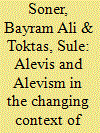| Srl | Item |
| 1 |
ID:
108462


|
|
|
|
|
| Publication |
2011.
|
| Summary/Abstract |
The Justice and Development Party (JDP, Adalet ve Kalk?nma Partisi) has launched a rapprochement policy toward the Alevis. The JDP's Alevi Opening has presented a unique case in Turkey's latest identity politics not only because Alevi claims, for the first time, came to be involved in political processes for official recognition and accommodation, but also because the process was handled by a political party which is regarded to have retained Islamist roots in Sunni interpretation. This article explores the JDP's Alevi Opening process and tries to explain the motivations behind the party's decision to incorporate the Alevi question in its political agenda. What is more, the debate that the opening has caused is also under scrutiny with the positions and arguments held by the actors and the agencies involved in the process, e.g., the Alevis (the secularist and the conservative wings), the General Directorate of Religious Affairs, the National Security Council, the JDP leadership and the Islamist intellectuals.
|
|
|
|
|
|
|
|
|
|
|
|
|
|
|
|
| 2 |
ID:
146802


|
|
|
|
|
| Summary/Abstract |
Cemevis emerged as the spaces of the Alevi identity in contemporary cities of Turkey. On the basis of in-depth interviews conducted in İzmir with the heads of cemevi associations, this study claims that, while cemevis were enforced by the process of urbanization, they have been transforming the Alevi practices and collective organizations and eventually constructing a new type of Alevism as to religious practices, community institutions and collective imagination. Though no legal–political recognition has yet been granted to cemevis as the places of worship, they have established themselves as central institutions of urban Alevis with their extensive use beyond the limited oppositional categorization of culture–religion. This denial of legal status which has been seen as the violation of basic human rights is one of the main constitutive dynamics in the ongoing debates on Turkey's Alevi question. It is to such an extent that the denial of legal status to cemevis has today come to be identified by Alevi groupings with the denial of Alevi collective identity itself.
|
|
|
|
|
|
|
|
|
|
|
|
|
|
|
|